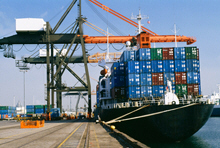
Typical street scene in Santa Ana, El Salvador. (Photo: iStock)
IMF Survey: Recession’s Dampening Impact on Trade Likely to Linger
September 30, 2010
- Trade severely affected by global economic crisis
- Many advanced economies’ imports set to stay below pre-crisis trends for years
- Crisis-hit economies should adopt reforms supporting output, trade recovery
Trade is rebounding from the recent recession, but has not yet fully recovered the ground lost during the global economic crisis. This is particularly the case in economies that were hit by a banking crisis, the IMF says in an analysis of how trade was affected.

IMF research finds that imports tend to decline sharply in first two years after financial crisis and remain depressed even in medium term (photo: Newscom)
WORLD ECONOMIC OUTLOOK
Because the crisis occurred in economies that account for almost half of global demand, the speed and extent of the recovery in their imports will have a significant impact on growth in their trading partners, the analysis in the IMF’s latest World Economic Outlook (WEO) says.
The WEO chapter, which looks at the impact of financial crises on imports and exports over the past 40 years, finds that imports tend to decline sharply in the first two years after a financial crisis and remain depressed even in the medium term. In contrast, exports are relatively unaffected.
IMF economists wanted to analyze trade dynamics following past banking and debt crises to help understand how trade might evolve in the wake of the recent financial crisis. They looked at 169 episodes of banking and debt crises in advanced, emerging, and developing economies. The authors tracked the behavior of imports and exports after these crises, both to estimate the overall trade declines and to assess the effects of various factors—such as output, credit conditions, and exchange rate dynamics—on trade.
Imports likely to remain down
They found that imports fall sharply after a financial crisis and remain below normal (that is, below their predicted level) even over the medium term, while exports are relatively unaffected.
A number of factors explain the decline in imports. The decline in output accounts for roughly half of the post-crisis fall in imports. In the early years of the post-crisis period, increased exchange rate volatility and currency depreciation are associated with the import fall. Over the medium term, poor credit conditions are also a factor.
Imports also fall disproportionately more than output following crises because demand for products that comprise a larger share of trade than of output experience a particularly large decline—for example, consumer durables or investment goods. This may be explained by the fact that demand for these goods relies heavily on credit, which is tight after a crisis.
The results imply that imports of many advanced economies may remain below pre-crisis trends for years to come. This has clear implications for countries that have relied on export-led growth.
The full recovery of import demand in countries that recently suffered a banking crisis—including the United States, the United Kingdom, and much of advanced Europe—may be more protracted than suggested by their tempered output projections, the analysis says. The recent narrowing of the large current account deficits of crisis countries may thus prove to be quite durable.
Need for structural reforms
The findings of the chapter underscore the importance for crisis-hit economies to adopt structural reforms that support the recovery of output and trade.
For economies that have relied heavily on demand from these countries, the findings highlight the urgency of boosting the contribution of domestic demand to growth—so that their economies are fired by “twin engines.”


